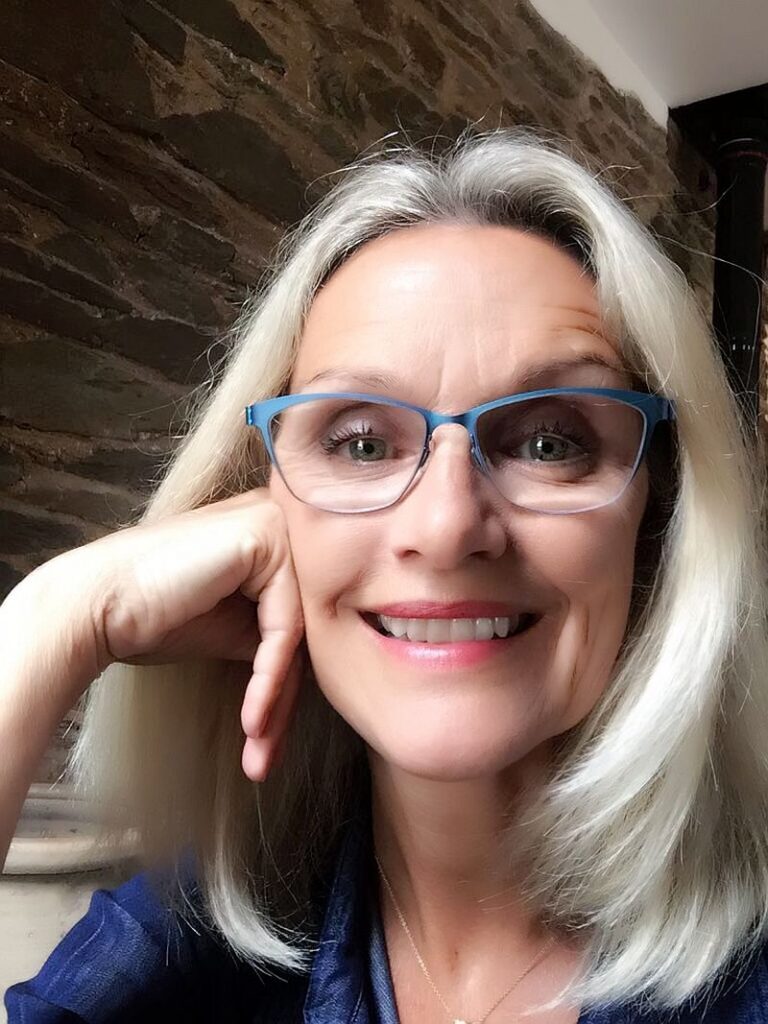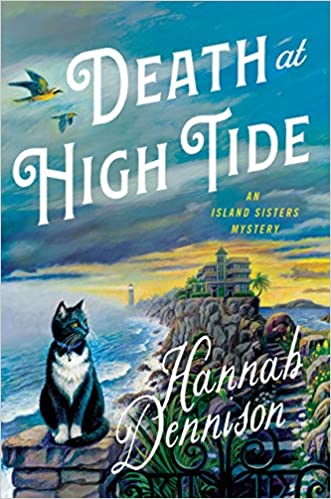
Hannah Dennison began her writing career as a trainee reporter for a small West Country newspaper in Devon, England. A member of Sisters in Crime, Mystery Writers of America, the Willamette Writers, and British Crime Writers’ Association, Hannah is the author of five books in the Vicky Hill Mystery series and six books in her Honeychurch Hall Mystery series. She has recently published Death at High Tide, the first book in her new Island Sisters series. Coincidentally, her mother is a docent at Greenway, Agatha Christie’s summer home, which has been turned into a museum.

About the book…
“For My Darling Wife: In the Event of My Death – If you are reading this letter, it means you are the proud owner of Tregarrick Rock Hotel…”
When Evie Mead’s husband, Robert, suddenly drops dead of a heart attack, a mysterious note is found among his possessions informing her that she owns the rights to an old hotel on Tregarrick Rock, one of the Isles of Scilly off Cornwall.
Still grieving, Evie is inclined to leave the matter to the accountant to sort out, but her sister Margot, who has taken time away from her glamorous career in LA, has other plans. Envisioning a luxurious weekend getaway, she buys two tickets―one way―to Tregarrick.
Evie and Margot find the hotel to be more fixer-upper than spa resort, and they attempt to get to the bottom of things. But the foul-tempered hotel owner claims he’s never met the late Robert, even after Evie finds framed photos of them in his office. The rest of the island inhabitants, ranging from an ex-con receptionist to a vicar who communicates with cats, aren’t any easier to read.
But when a murder occurs at the hotel, soon followed by another, their frustration turns to desperation as they become the primary suspects. There’s no getting off the island at high tide and it falls to them to unravel secrets spanning generations if they want to make it back alive.
AER: With two successful mystery series going, what prompted you to start a new series?
HD: I actually didn’t intend to write a new series at all until I met a friend of my sister who told me about her life as an HR Director on a resort in the beautiful Isles of Scilly. She said that seasonal workers often fled to the islands because they were running away from something or hiding from someone. This idea intrigued me and I knew it would be a great foundation for a series.
AER: How do you know that an idea will carry a whole series?
HD: That is a good question. The first book I ever wrote – A Vicky Hill Exclusive! – was written as a one-off. I started writing it in a UCLA Extension Writers’ Program Beginner’s Fiction class because my daughter had gone off to college and I was suffering from the empty nest syndrome. I already had a background in screenwriting but not long-form fiction.
I soon realized that since Vicky Hill was an aspiring investigative reporter— though stuck writing obituaries in a small market town in England—there were no end of possible storylines for murder and mayhem. Anthony Horowitz (Foyles War, Midsomer Murders) says, “English villages are special places where hatred and mistrust and suspicion and anger and bitterness have a natural place to grow.”
AER: Kind of spoils my idyllic image of English country villages. How did you use these elements that we usually don’t hear about from the UK Tourism industry?
HD: I found them very useful for the Honeychurch Hall series that feature a mother-daughter duo who live on a sprawling country estate (a contemporary Downton Abbey,) although now that I’ve just finished my seventh book in the series, I’ve had to give the estate a village since there are only so many times the butler can do it!
AER: So what are the key ingredients for a good mystery series?
HD: In a nutshell, you need a protagonist with an interesting occupation or, if retired, someone like Miss Marple; also, a setting that lends itself to mischief, and a small cast of recurring characters. I’ve found that readers who invest in a series do so because they feel each instalment is like visiting old friends. The books are just as much about the characters and their relationships as it is about the actual murder.
AER: You’ve completed your first book. How far ahead do you plan the other books in a series?
HD: To be honest, I don’t plan ahead. What interests me is a strange incident that I may have read or heard about where I think “Oh! Yes, that would be great for Vicky or Kat or Evie.” I’m constantly on the lookout for stories. Ask my family – they say a vague look comes over me and I mutter, “I must write that down.”
AER: How do you juggle the writing of different series at the same time?
HD: It’s very stressful because I write for two different publishers so I don’t have the luxury of picking my deadlines. However, I’m usually at a different place in the story process for the different books. I can be writing a rubbish first and second draft while working on revisions and copyedits of a “finished” manuscript, but I couldn’t create two stories from scratch at the same time.
AER: You’re incredibly prolific. What is your writing process that allows you to produce several books a year?
HD: I have to write early in the day. I get up at six and spend a solid three or four hours on the book that is at the hardest point to write or needs intense thought or revisions. I walk dogs, run errands (with a mask!) and after lunch, settle down for a couple more hours to play in the sandbox with the new idea that doesn’t need carefully crafted sentences. Yet.
AER: Which authors have influenced your own writing?
I think my favourite authors have influenced me by osmosis. I would include Agatha Christie, Mary Stewart, M.M. Kaye, Dodie Smith, Barbara Pym, M.C. Beaton and Jilly Cooper.
AER: Are there books on the craft of writing that you would recommend?
HD: There are so many that it’s easy to get overwhelmed. But my top five are Becoming A Writer by Dorothea Brande, Making A Literary Life: Advice For Writers And Other Dreamers by Carolyn See, The War Of Art by Steven Pressfield, On Writing: A Memoir of the Craft by Stephen King, and Bird by Bird by Anne Lamott. I also recommend Caroline Donahue’s Secret Library podcast series (it’s free) of interviews with writers discussing their processes and work.
AER: Any suggestions for aspiring mystery writers?
I have two pieces of advice: Make sure to develop your characters before starting to write. When writers get stuck, it’s often because they don’t know their characters. And second, finish that first draft. Only then will you be able to really start writing because writing is just rewriting. Think of it as a marathon, not a sprint.
